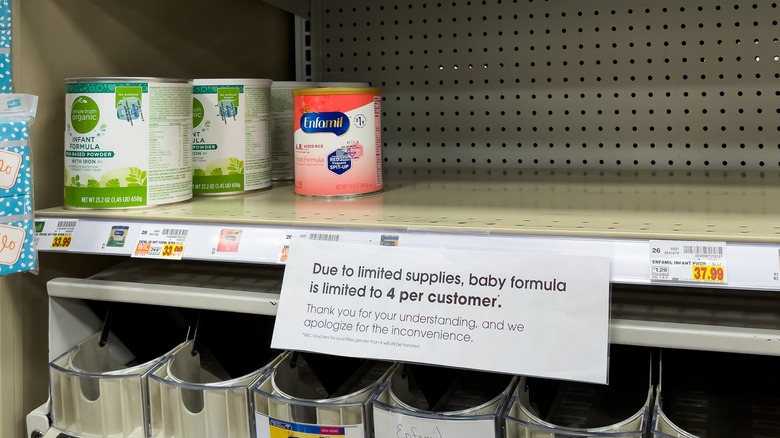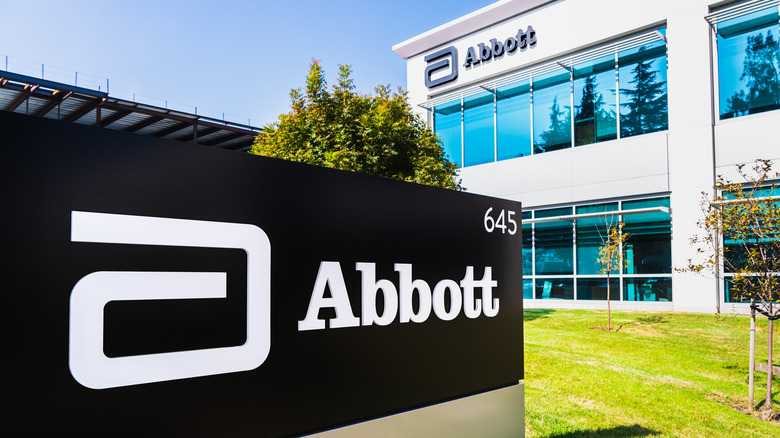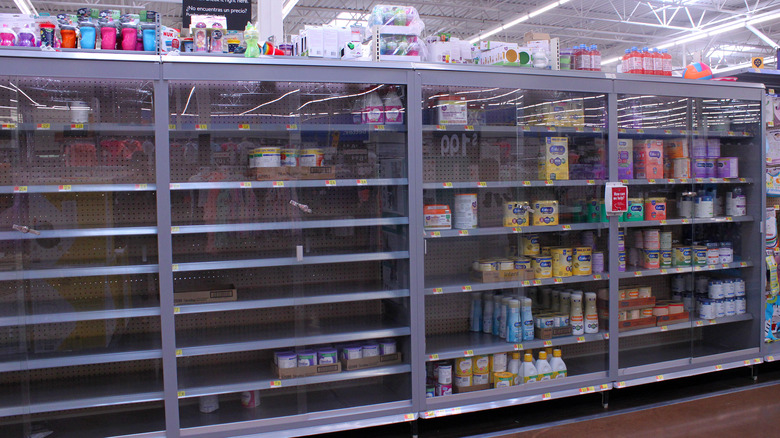How Corporate Greed May Have Led To The Baby Formula Shortage
Monopoly: not just a board game. The entire baby formula industry in America is owned and operated by just a few companies, which poses an enormous risk when incidents like the one at Abbott Laboratories halt production.
Abbott's factory in Sturgis, Michigan, was recently shut down after FDA investigators discovered Cronobacter sakazakii on the premises, per CNBC. According to the CDC, Cronobacter sakazakii is a rare but deadly germ that can live in dry foods, like powdered baby formula. In February, the FDA issued an official recall of all Similac, Alimentum, and EleCare products from Abbott's Sturgis factory — all types of powdered formula.
About 90% of the infant formula industry in the United States is controlled by just four firms, per NPR, with Abbott alone controlling 40%, according to TIME. Most families in America rely on formula, the outlet says, and when massive companies monopolize the market, even temporary shutdowns can have dangerous ramifications — a reality many parents are witnessing in real time.
Abbott's stinginess might have caused the outbreak
The Guardian reports that Abbott Laboratories detected amounts of bacteria eight separate times between 2019 and 2021, the same time the company saw its profits rise by 94%. Speaking to The Guardian, Rakeen Mabud, chief economist for Groundwork Collaborative, said Abbott failed to think about its customers first. "Abbott chose to prioritize shareholders by issuing billions of dollars in stock buybacks instead of making productive investments," he told the paper, adding, "It's important that we have high standards for something as vital as baby formula."
One whistleblower, an unnamed ex-employee at Abbott, recently released a confidential disclosure statement outlining in detail the gross negligence of the company to execute maintenance measures that would've kept their Sturgis factory's machinery food-safe. Although much of the statement has been heavily redacted, the ex-quality assurance employee states that they repeatedly raised concerns over what they recognized as "a series of violations of regulatory requirements" necessary to manufacture safe formula. The multitude of their complaints, they report, eventually lead to their wrongful termination of the company, which is now under investigation by OSHA, per the statement.
On May 13, Abbott released an extensive description of the sanitization processes and safety measures it has implemented since the recall. However, despite admitting to this thorough list of changes, Abbott still insists the evidence that its formulas killed or harmed young children is inconclusive — a statement the company explicitly made via Twitter on May 13, the exact same day.
The FDA is taking steps to ensure this doesn't happen again
To restock empty baby formula aisles nationwide as quickly as possible, the USDA approved a plan with Abbott to reopen the Sturgis, Michigan, factory in as soon as one week's time, as of May 19, reports Reuters. FDA Commissioner Robert Califf spent three days touring the Sturgis facility and determined that enough changes had been implemented by Abbott that the premises are safely operational.
House of Representatives Appropriations Committee Chair Rosa DeLauro worries that this reopening might be happening too soon. "I remain concerned about the safety of the formulas that end up on our shelves," DeLauro said in an official statement. "The FDA's recently released guidance does not go far enough to ensure formula is safe."
In an effort to offset the monopolization of the U.S. baby formula industry, the FDA reports plans to increase imports of formula from foreign manufacturers, per CNBC. These imports will then be subjected to FDA approval before they can be released to the public but — considering 98% of the formula consumers typically buy comes from U.S. suppliers, per The White House — increased imports have the potential to detract power from some dangerously massive companies.


